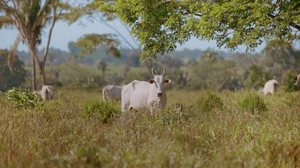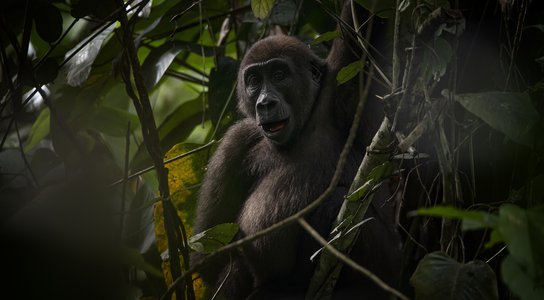When we think of rainforest destruction, images of fires and chainsaws most likely spring to mind for the majority of people. But cows? Less so. Maybe that’s changing.
We’ve been exposing the impact of beef production on deforestation for several years now, and it seems our message is starting to hit home. In June, the US Senate Committee on Finance hosted a hearing examining the role of cattle supply chains in Amazon deforestation – with special guest JBS, the world’s biggest meat supplier company, in the hot seat.
The committee officials told us the hearing was in part inspired by our report Beef Banks and the Brazilian Amazon, which exposed JBS’s lack of accountability for its deforestation impact.
It can’t have been a pleasant experience for the JBS representative when Senators at the Committee challenged them about their poor deforestation monitoring, or when our friends from the Environmental Investigations Agency laid bare the evidence of how cattle laundering occurs in the Amazon – or indeed when a representative for US cattle farmers compared them to the mafia:
“…you look at their [JBS’s] track record and they act just like the mafia did here in the meat business 50, 60 years ago. It’s terrible. And now we’re going to trust these people who bribed government officials down in their own country, to track this? I’m sorry, but you know, the facts show that they’re not good people. And so far, they need to earn our trust before we give them ours.” - Leo McDonnell, Montana rancher and representative for the US Cattleman’s Association, speaking at a Senate Committee on Finance hearing in June 2023.

Still taken from The Landless, a Global Witness documentary telling the story of a community on the frontline of land grabs in the Brazilian Amazon.
The US Senate’s inquiry is long overdue
I’ve recently come back from a trip to the Brazilian Amazon to look at the impact of cattle grazing on forests and the Indigenous communities that live in them. What I saw was shocking.
When I set off on my first trip along the trans-Amazonian highway through the vast rainforest, I was expecting a cruel red slash of a road through a dense green canvas. But the reality was in fact far, far worse.
The road did not, in fact, cut through high, lush trees on either side, as expected. Instead, the highway traversed rolling fields, far into the distance. While there were patches of trees dotted here and there, what I saw was essentially miles upon miles of farmland. It was pleasant enough to look at - until you recalled the ecological majesty of the Amazon, wondering what was once here too, before nearby communities were driven away and the canopy replaced by fields.
Burger today. Rainforest gone tomorrow.
In most cases in the Amazon, it’s illegal to graze cows on deforested land. This is certainly true for Indigenous lands. But evidence as heard by the US Senate suggests, that deforestation is happening all the time to make space for cattle grazing.
I think about the drivers that, to my mind, are a root cause of all this. Let’s say, for the sake of a thought experiment, that around 30 cows could be grazed on a single square km of land – enough in this example to fatten-up the animals to sell to beef traders. Those 30 cows could be turned into around 50,000 burgers. One popular statistic estimates Americans eat around 50 billion burgers a year, these 30 cows would satisfy US demand for less than 0.03% of a single day. This isn’t meant to be an illustration of exactly what happens in US beef supply chains– but a deeper question about the kinds of trade-offs we make thanks to the magic, seemingly invisible hand of the market.
It’s sad to think how something like those few burgers – and the attendant profits – could be viewed as equivalent to a kilometre of beautiful forest teeming with life. These hillsides I saw, dotted white with cows, are part of this depressing, climate-wrecking - and seemingly ever expanding – exchange.
This terrible trade-off of rainforest for burgers is not only disastrous for the environment, but also for US cattle ranchers, who think it’s unfair to have to compete with lawbreakers like JBS.
Since the global economy is failing to spur the action needed to protect forests or their people, the wildlife within it, and its critical local and global climate-cooling function, many – including us at Global Witness - hope that lawmakers will step in.
Hope grounded in experience
There’s hope too within Brazil. President Lula, back in power after 12 years, has introduced a deforestation action plan, including improving law enforcement, and promising to protect land belonging to Indigenous people who themselves have a long history of protecting the forest.
It shouldn’t be necessary for the Brazilian government to raise and spend millions of dollars enforcing the anti-deforestation laws for the supply chains that ultimately benefit the international beef companies and their financiers. These are companies with environmental and social governance departments and glossy net zero plans. They should respect the laws of the places they work in. But sadly, enforcement and fines are necessary.
The Chair of the US Senate hearing opened the session by saying: “When you burn the Amazon, you burn the lungs of the Earth,” expressing his determination to continue working on this issue.
We also plan to play our part. The cows I saw grazing alongside the Trans Amazonian Highway are, of course, completely oblivious to the climate destruction they are part of. We’re making it our job to ensure that the relevant companies - and their financiers based in London, New York, China, and European capitals - are not.
Back in the Amazon, my road trip ended on the land of the Arara Indigenous peoples, where suddenly nature sprung into life by the side of the road. Dozens of species of tree grew, birds sang and not a patch of sky was visible through the dense vegetation.
The Arara community clearly knows how to protect the forest. We hope US Senators can learn something from them – including how to stand up to giants like JBS. Having heard the facts, we urge Senators to swing into action and support the FOREST Act, cutting of the US market for beef coming from illegally deforested land. If we are to keep one of the world’s most precious ecosystems intact, the time to act is now.


